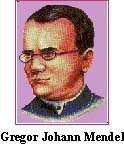Did you see today's google doddle? For those of you who have studied inheritance or genetics might have heard of this name, Gregor Mendel. He is known as the "father of modern genetics".
Here is a biography on Gregor Mendel taken from www.pinkmonkey.com :

Read More..
"Gregor Johann Mendel was born on July 22, 1822 in Moravia, Austria. He had his early education in a monastery in Brunn, Austria (now Brno in Czechoslovakia) and later studied science and mathematics at the University of Vienna. He graduated in 1840. Mendel returned to the monastery in Brno as a monk. He worked as a teacher of physics and natural science in a Higher Secondary School of Brno during 1854 to 1868. He was appointed abbot of the monastery in 1868 and held this post until his death.
Mendel carried out his legendary experiments on garden pea plants in the monastery garden from 1857 to 1865. He had a clear perspective and worked on the experiments with precision and thoroughness. He published his research paper containing his observations and conclusions in 1866 in the annual proceedings of the Natural History Society of Brunn. These conclusions are now known as Mendel’s Laws. This work is a classic in biology for its elegance and simplicity and ranks amongst the most outstanding biological contributions of all times.

But unfortunately, this work failed to attract the attention of the biologists of that time. Hence, it went ignored for 35 years. One of the possible reasons for such neglect was the inability of the biologists of that time to understand and appreciate the statistical approach adapted by Mendel. Thus, Mendel was left bitterly disappointed, and died an unrecognized death in 1884.
Sixteen years after Mendel's death, in 1900, Hugo de Vries (Holland), Karl Korrens (Germany) and Von Tschermark (Austria) independently arrived at similar conclusions as those of Mendel. De Vries rediscovered the research paper of Mendel and it was published again in 1901. The experiments on heredity of plants and animals since then have confirmed that Mendel's laws of heredity are applicable to other organisms as well. They form the basis of modern genetics. Hence, Mendel is called The Father of Genetics."
 -->
-->

